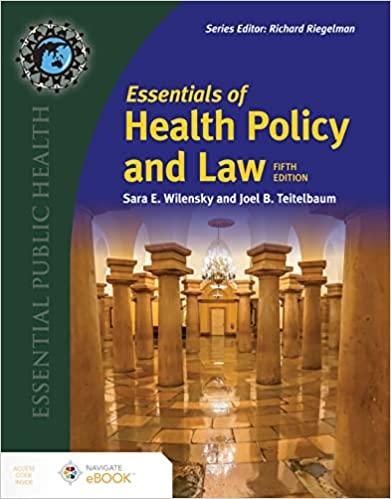Question
Free Speech Fred Phelps founded the Westboro Baptist Church in Topeka, Kansas. The church's congregation believes that God hates and punishes the United States. The
Free Speech Fred Phelps founded the Westboro Baptist Church in Topeka, Kansas. The church's congregation believes that God hates and punishes the United States. The church frequently communicates its views by picketing at military funerals.
Lance Corporal Matthew Snyder, a member of the U.S. Marines, was killed in Iraq in the line of duty. Lance Corporal Snyder's father, Albert Snyder, selected the Catholic Church in the Snyders' hometown of Westminster, Maryland, as the site for his son's funeral. Phelps traveled to Maryland with six other Westboro Baptist parishioners to picket at Lance Corporal Snyder's funeral service. The Westboro congregation members picketed while standing on public land adjacent to a public street approximately 1,000 feet from the church. They carried placards that read "God Hates the USA/Thank God for 9/11," "America Is Doomed," "Thank God for Dead Soldiers," and "You're Going to Hell." The picketers sang hymns and recited Bible verses. The funeral procession passed within 200 to 300 feet of the picket site.
Albert Snyder filed a lawsuit against Phelps and the Westboro Baptist Church ("Westboro") in U.S. district court. Snyder alleged intentional infliction of emotional distress and other state law tort claims. Westboro argued that their speech was protected by the First Amendment. The jury found for Snyder and held Westboro liable for $2.9 million in compensatory damages and $8 million in punitive damages. The U.S. district court remitted the punitive damages to $2.1 million. The U.S. court of appeals held that the First Amendment protected Westboro's speech and reversed the judgment. Snyder appealed to the U.S. Supreme Court.
Does the Free Speech Clause of the First Amendment shield church members from tort liability for their picketing speech at funerals? Snyder v. Phelps, 562 U.S. 443, 131 S.Ct. 1207, 2011 U.S. Lexis 1903 (Supreme Court of the United States, 2011)
Step by Step Solution
There are 3 Steps involved in it
Step: 1

Get Instant Access to Expert-Tailored Solutions
See step-by-step solutions with expert insights and AI powered tools for academic success
Step: 2

Step: 3

Ace Your Homework with AI
Get the answers you need in no time with our AI-driven, step-by-step assistance
Get Started


